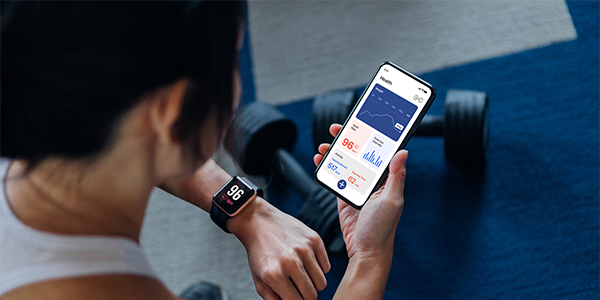4 Benefits of Fitness Trackers
Considering a fitness tracker to improve your health? Today’s wearable fitness technology now brings the doctor’s office to your wrist (or even your finger).
Whether it’s a smartwatch, fitness band or other athletic wearable tech, these devices can offer personalized fitness advice, provide immediate health feedback and help analyze your data to identify patterns.

1. Monitor Heart Health
In the past, electrocardiogram (ECG) machines lived only in medical offices and hospitals. Now a small device can measure the electrical rhythm of your heart using sensors on your wrist or, for slightly better accuracy, a chest strap.
Can you trust a digital health tracker to monitor your heart or catch irregular rhythms?
Julie Dominguez-Jones, M.D., a family medicine doctor at Sutter Medical Foundation, believes you can, alongside guidance from your healthcare provider. “My patients really like the heart rhythm features,” she says. “But if it goes off and they don’t understand why, it can be nerve wracking. Luckily they can contact me or come to the office.”
If you have an existing heart condition, talk with your doctor about the best option and get precise instructions for using a monitoring device. That way, if you get an alert, you’ll know what it means and what to do. If you suspect you may be having a heart attack, call 911 immediately or go to the nearest emergency room.
2. Manage Diabetes
If you live with type 1 or type 2 diabetes, you can integrate a continuous glucose monitoring (CGM) device with a fitness tracker to better manage blood sugar levels. The CGM device has a tiny sensor that goes under your skin and wirelessly transmits glucose data to an insulin pump (if you use one) and a compatible fitness tracker (smartwatch or smartphone). You’ll be alerted immediately if your glucose levels are low or high or if you’re running out of insulin.
3. Improve Sleep
If a wristband feels too bulky in bed, try a sleep ring. These small devices contain sensors to monitor and record the quality and quantity of your sleep — a key metric for cognitive and emotional health and even weight management. Some ring models double as activity trackers and can monitor your heart rate, body temperature and even the date of your next period.
Whether through a ring or smartwatch, sleep trackers can help you identify patterns so you can make changes in your routine. If you suspect you may have a medical condition like sleep apnea, get a medical sleep study for diagnosis.
4. Motivation to Move
Using a fitness tracker can raise your awareness of your activity throughout the day. Some apps remind you to move, let you set personal fitness goals or suggest workouts tailored to you. Many let you geek out on workout recovery metrics, such as breathing rate, heart rate variability, VO2max (a measure of aerobic endurance), skin temperature and how sleep affects your workouts.
If a device helps you stay healthy and motivated, that's great! But Dr. Dominguez-Jones warns about the dangers of getting overly consumed with health and fitness trackers.
“If you get too caught up it can raise anxiety levels,” she says. “There are times when you need to unplug. You don’t need all apps reminding you all the time. There has to be a balance.”




